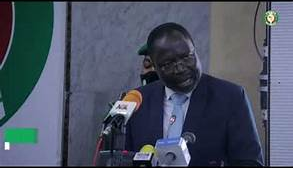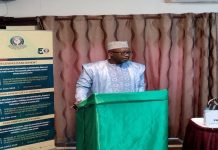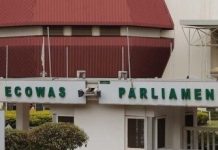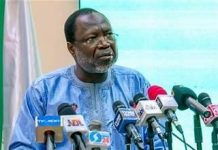By: Kebba AF Touray
The President of the ECOWAS Commission, Dr. Omar Alieu Touray, has warned against the decision of Burkina Faso, Niger and Mali’s withdrawal from the regional bloc, saying the consequences of their actions are adverse and numerous.
The consequences, as outlined by President Touray, include but not limited to the suspension of ECOWAS projects and programmes worth over US$500 Million, the job insecurity of 130 ECOWAS Staff, as well as closure of seven regional offices in the said countries.
ECOWAS Commission President Dr. Touray made the aforesaid statements at the ECOWAS Parliament in Abuja, during the official opening of the inaugural session of the Sixth Legislature of the ECOWAS Parliament on Thursday, 4 April 2024.
Dr. Touray underscored that the region is faced with challenges and the risk of disintegration and reminded the sub-regional parliamentarians that it was on the 29 of January 2024, when Burkina Faso, Mali and Niger, notified the Commission of their intention to leave ECOWAS with immediate effect.
“Our people, the people of West Africa, have lived in one integrated ECOWAS community for several decades, and have enjoyed freedom of movement within the region. They have started seeing the benefits of our common market where original products are traded freely among 400 million people, and also move about with a common passport and a common biometric identity card,” Dr. Touray said. He said disintegration of the Commission will not only disturb the freedom of movement of the people, but will aggravate insecurity of the region. He said the withdrawal will affect security cooperation in terms of sharing intelligence and participation in regional counter-terrorism and other security initiatives such as the multi-national joint taskforce.
According to Dr Touray, the withdrawal may also lead to diplomatic and political isolation of the three countries which in turn can affect the immigration status of their citizens to travel around the region, and may not be able to reside or set up businesses under the current ECOWAS arrangement. He said the three countries will also cease to use the ECOWAS passport and the ECOWAS Biometric National ID Card as a travel document for their nationals due to their withdrawal.
He told representatives from Member states that the withdrawal of these countries will affect the job security of some 130 ECOWAS staff, 77 of whom are from Burkina Faso, 23 from Mali and 32 from Niger. Due to these ramifications, Touray said they advised the Chairperson of ECOWAS Authority of Heads of State and Governments to open dialogue for discussion between the Commission and these three countries. He said the dialogue is spearheaded by President Tinubu and it aims to maintain the unity of ECOWAS.
‘‘This is why we have invited representatives from all the countries in transition to join the ECOWAS Parliament,” he said.
He informed the representatives that over the years, the ECOWAS Parliament has intensified efforts to respond to the aspirations of the people of the sub-region, and that the Fifth Legislature, under the leadership of Former Speaker Tunis, pursued the task of representation by contributing to the COVID-19 pandemic recovery in the community.
“We at the Commission enjoy the close cooperation and collaboration of members of the Fifth Legislature of the ECOWAS Parliament, through their numerous debates on important subjects of our integration process,” Dr. Touray said, and reported that parliamentarians in collaboration with the commission undertook election assistance activities and mediation processes in the member states.
He said such activities were conducted in Nigeria, Liberia, and Guinea Bissau and most recently in Senegal, where a peaceful transfer of power from Ex-President Macky Sall to his successor Bassirou Diomaye Diaharr Faye, was made. He expressed confidence that they will have a similar peaceful transition in Ghana later this year, adding that these translations show that democracy is aligned in the region as represented by regular election and good governance.
He recalled that these successful and peaceful transitions, is the recognition of the progress that the community has made, despite the challenges that confront them.
As representatives of the people, he told the incoming ECOWAS Legislature that their role in these efforts is crucial, and expressed his conviction that members of the Sixth Legislature will live up to their responsibilities and that their term of office will also be marked by further progress towards deeper regional integration.



















